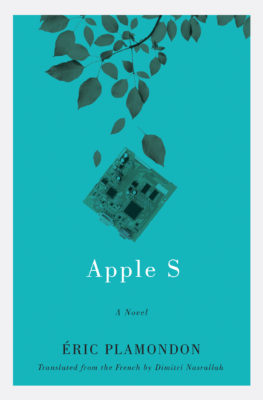What is most striking about Apple S – and the entire 1984 Trilogy, of which it is the final instalment – is its form. It’s written as a series of short chapters, some of which concern the novel’s main topic (Steve Jobs), as well as other figures and historical moments (George Orwell, Alan Turing, René Magritte, the formation of Silicon Valley, etc.), while others document the life of Gabriel Rivages, a stand-in and alter ego for the author. Steve Jobs is ostensibly the main through line, but, at the same time, that’s not always present, since he is given less space than all of the other through lines put together. Each chapter, beginning with a new topic, resembles a standalone poetic or narrative essay, often with a twist in the last sentence.
All of this has a tendency to keep matters mostly on the surface, which is perhaps a criticism. However, keeping things on the surface is the trilogy’s greatest strength, as it gives the writing an intensely contemporary feel, echoing our daily habits of Wikipedia and Google searches. Connections might be made simply because things happen in the same year, information easily gathered online, and this playful approach to history feels almost too much like how we live and understand the world of today. This freedom to effortlessly jump from topic to topic also leaves the reader open to occasionally being blindsided by sudden surges of thematic depth or heartfelt sentimentality (the latter mostly when Rivages writes of the joys and pains of fatherhood). Everything is on the surface – until suddenly it’s not.

Apple S
Éric Plamondon
Translated by Dimitri Nasrallah
Esplanade Books
$19.95
paper
236pp
9781550655421
I thoroughly enjoyed reading the entire trilogy and was especially grateful for its rejection of most aspects of the conventional novel, but I also felt suspicious of an overarching cleverness that brushed against so many difficult questions, while at the same time brushing them off. Much like a Google search, this work gives us a great deal of information, and makes unexpected connections, while allowing the reader to do with it all as they may. I wonder if it’s an unfair criticism to say that, at least for me, this work fails to push hard enough in any particular direction, spreading out like the internet in all directions at once. Fair or unfair, this criticism is not of a shortcoming but of what the book has set out to achieve.
Toward the end, Apple S draws connections between sixties counterculture and the home computer revolution. This definitely made me reflect on the ways the internet has and has not fulfilled its promise. On the difference between IBM and Apple: “A closed computing system limits the possibilities of the user, but it is more stable and more predictable. An open system is a lot more fragile and less reliable, that’s the price of liberty.” This trilogy is nothing if not an open system. Writing that makes connections that are simultaneously slight and sharp, fragile and less than reliable, in some sort of direct rebuke to things (such as conventional literature) that claim to be reliable but so often let us down – which is why it feels so much like the literature of our time. mRb






0 Comments